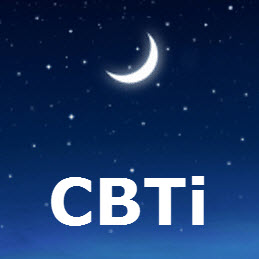 CBTi As Medical/Psychological Treatment: CBTi is available as practiced by state licensed therapy professionals such as psychologists, physicians including psychiatrists and sleep specialists, social workers, licensed professional counselors, nurse practitioners. It is often covered by insurance, as are other forms of psychotherapy, when based on an appropriate diagnosis such as Insomnia Disorder (DSM 5 code 780.52) or Circadian Rhythm Sleep-Wake Disorder ( 307.45) or other Sleep-Wake Disorder (780.59). Sleep Centers may offer this therapy option. As with any medical or psychological treatment, there are indications (benefits) as well as risks, complications, and contraindications. CBTi may not be appropriate when there is medical illness or psychiatric illness that should be treated first or simultaneously (e.g., head injuries, prostate disease, depression, alcohol and drug disorders, sleep apnea, to name a few). For a nice review of this treatment, see Cognitive Behavior Treatment of Insomnia by Perlis, Jungquist, Smith, and Posner.
CBTi As Medical/Psychological Treatment: CBTi is available as practiced by state licensed therapy professionals such as psychologists, physicians including psychiatrists and sleep specialists, social workers, licensed professional counselors, nurse practitioners. It is often covered by insurance, as are other forms of psychotherapy, when based on an appropriate diagnosis such as Insomnia Disorder (DSM 5 code 780.52) or Circadian Rhythm Sleep-Wake Disorder ( 307.45) or other Sleep-Wake Disorder (780.59). Sleep Centers may offer this therapy option. As with any medical or psychological treatment, there are indications (benefits) as well as risks, complications, and contraindications. CBTi may not be appropriate when there is medical illness or psychiatric illness that should be treated first or simultaneously (e.g., head injuries, prostate disease, depression, alcohol and drug disorders, sleep apnea, to name a few). For a nice review of this treatment, see Cognitive Behavior Treatment of Insomnia by Perlis, Jungquist, Smith, and Posner.
CBTi Principles and Strategy Used in Self Help, Coaching, Training, Education: The theory behind CBTi and its techniques are often adapted by those who are dissatisfied with their sleep and decide to educate themselves ( as an alternative to home remedies, advice from friends, herbs, or over the counter pills). Because CBTi has been well researched and is widely recognized to be as effective as sleeping pills in the short term, and perhaps better in the long term, people with various insomnias want this option. Sometimes it is not easy to locate an experienced and available sleep therapist, and this too leads to self help. Sleep coaches and training are also options.
I’m going to summarize what I think are the essential principles and philosophy behind the application of CBTi to yourself. I am assuming you have no complicating medical or psychiatric problems. The essential principles are:
- Accept and prepare yourself to feel worse at first, as you get started, in exchange for the longer term benefits of good sleep. As with exercise or learning to ride a bicycle or stopping smoking, there is initial effort or discomfort, or in this case increased sleepiness and malaise, until you get to enjoy the benefits of restedness and better health.
- You want to increase sleep efficiency: either you are in bed asleep, or you are out of bed doing something else.
- Data collection regarding time in bed, time awake, daily sleep schedule, and related specifics to determine progress or need to adjust.Other principles often include:
- Control and management of light (including electronics), chemical substances (nicotine, caffeine, alcohol, drugs, foods), temperature, noise, pets, bed partners.
- Management of thoughts, worries, emotions, etc
- The quality and type of sleep that one gets using sleeping pills may differ from the kind resulting from the usual sleep-wake switches in the brain. Some sleeping pills are apparently perfectly fine. (Note: The “sleep” that can result from general anesthesia, head injury, and alcohol is usually different: people often do not feel they have slept.)
- Further details of CBTi will be available in these blogs from time to time. New research will add to our knowledge of this treatment, the focus of which is control of those habits which have developed in your life and which are interfering with your right to feel and be well rested.
Leave a Reply